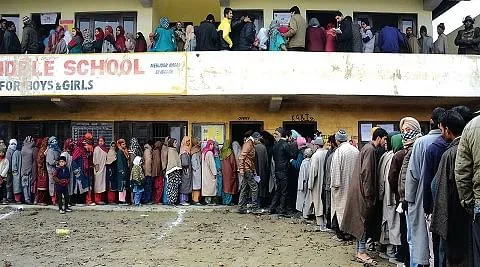From January 19, 1990 to October 9, 1996, count the days, months and years – this was the period when Jammu and Kashmir was under Central rule. It was a national record, because no other state had ever been under the Presidential rule for so long. The militancy and the idea of militancy as a solution to Kashmir problem was high on the minds of the people. They had come to believe that guns had the ultimate answer to their woes. They had lost trust in vote and there was no appetite for elections. The elections were seen as synonymous to death and destruction.
This also was the time when anyone talking about elections or revival of political process appeared on the hit list of the militant groups, and many former legislators, mostly from National Conference, were killed. There was no desperation for elections in Kashmir, because the people were worried more about their safety and that of their families.
There was something more dangerous than getting shot by bullets. Farooq Abdullah , who had resigned as Chief Minister, had to shut all the doors of his house at Gupkar Road, as the abuses were blared about him and his family members from the loudspeakers. It was more killing than getting shot, he had told a group of foreign journalists.
Farooq Abdullah had resigned in protest against the appointment of Jagmohan as Governor in January 1990. He had not fore-sensed risks involved in quitting the government and what the Central rule would mean to the people at that juncture. In any case, the Centre had made up its mind to dismiss the Farooq Abdullah government.
This period is of utmost importance to the modern history of J&K. The problem can be traced to 1983 polls that brought communalism as a new anthem in J&K’s politics. On July 2, 1984, when his government was dismissed and another government installed by the combination of Congress and 14 defectors from the original National Conference – the script for what happened in 1989 onwards was written. The return of his government on November 7, 1986, could not undo the political catastrophe in making.
When institutions break, they shatter like glass not steel. The political institutions are manifestation of individual aspirations amalgamated into groups that work toward good of all. This is what was happening in J&K. The loss of credibility in the political institutions was destabilizing all other institutions, too. That is how the things were unfolding in Kashmir.
This recall tells a story, never intervene nor interrupt the democratic calendar anywhere, particularly when the sensitive place like Jammu and Kashmir is involved. After 1977, the elections were held as scheduled in 1983, and the next polls were due in 1989. Imagine had 1984 not happened, there would have been no 1987 and also no charges of rigging and the rise of the Islamic fundamentalism, nor Pakistan would have fished in the troubled waters of Kashmir as much as it did. The 1989 would have led to 1995 and then 2001 and 2007 and 2012 and 2018. This calendar disappeared because of the ugly interventions. The political conspiracies were also at work all the time. The political parties in opposition were partners in conspiracy against all the ruling parties from the day one in creating an atmosphere of distrust about the ruling party or parties. The 2008, 2010 and 2016 street protests and violence were result of the political rivalries in which the local discontent against the government – which is a universal phenomenon – was tapped to trap the government in firefighting mode. The eagerness to ascend to power made the things to collapse.
Past cannot be erased. But the safety valves can be put in place for future. Today , the situation is different. The elections is need of the hour, and unless the power is devolved to the real elected representatives , the democracy in Kashmir will be questioned . And these questions have cropped up from beyond the borders – some of these questions are in public conversations, others are confined to the private discussions.
Prime Minister Narendra Modi, Home Minister Amit Shah and ever-energetic Lieutenant Governor Manoj Sinha, have committed to the nation especially the people of Jammu and Kashmir that Assembly elections would be held after the Delimitation exercise is completed. And the last we know is that the Delimitation Commission would be submitting its report by March 2022, when its extended term expires. That’s the hope if the third wave of the pandemic doesn’t strike .
I had asked a question to late Gen. K V Krishna Rao in December 1995, why was he keen on Farooq Abdullah contesting? His answer was revealing, “Tell me, who will contest elections if he is bumped off?” There was no leader on the horizon who could lend credibility to elections. Today, there are many leaders but what use are they if they are seen groping in dark. Yes, there is a procedure that the government will have to follow. On its part, the government should make the political process look more credible. The game of musical chairs that is going on will benefit no one.
LG Manoj Sinha as a seasoned politician and administrator knows the significance of the institutions, and he has voiced his commitment to elections time and again. History has its own ways of judging personalities. Sinha has a grand opportunity to etch his name in the history as a man who made the elections possible with his concerted efforts. The world is watching .







